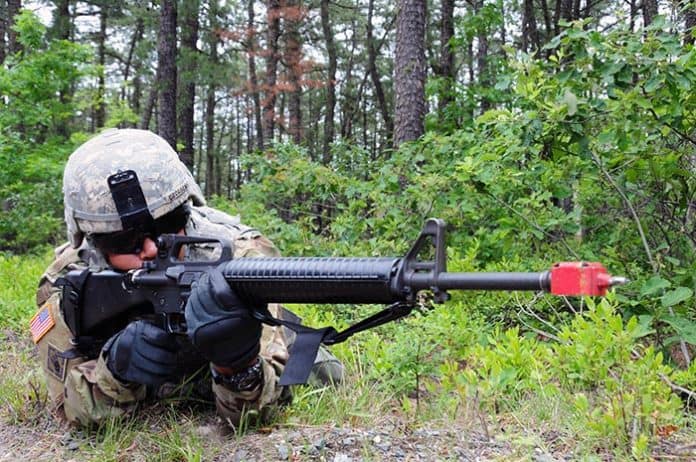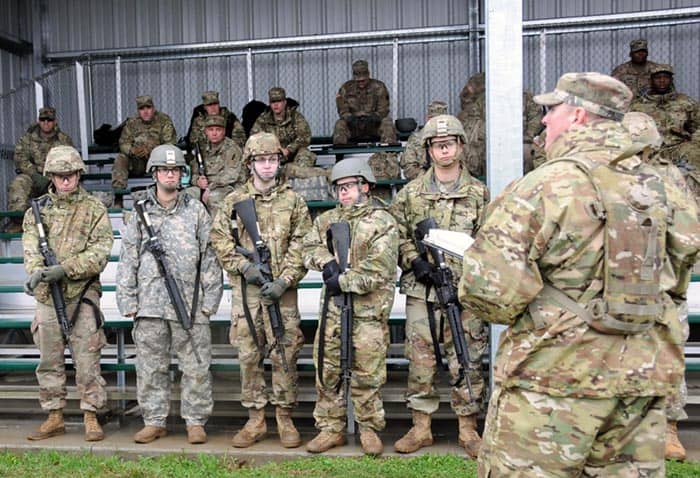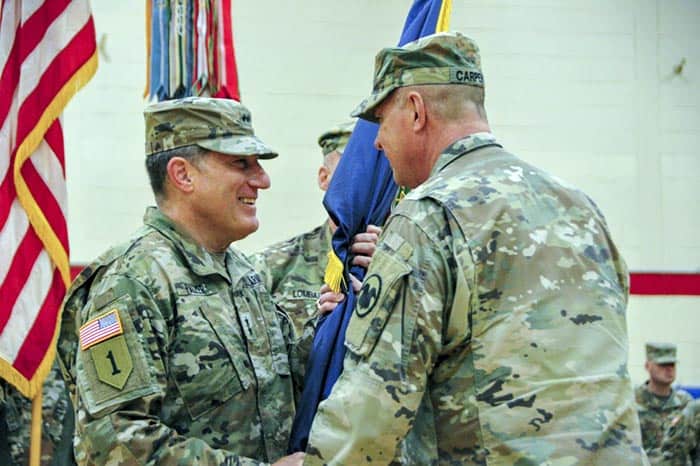
JACKSON – The Army celebrated its 244th birthday on June 14 and township resident Major General Mark W. Palzer noted that anniversary in his new role as Commanding General of the 99th Readiness Division.
Palzer’s command provides base operations support to all Army Reserve Soldiers, units, facilities and equipment for the entire Northeast Region of the Army Reserve. The general works out of Joint Base McGuire-Dix-Lakehurst.
Base operations include personnel administration, finance, facilities management, logistics management, maintenance, public affairs and legal support.
Originally from Huntington Station, New York, Major General Palzer and his wife Donna moved to Jackson with their three children Stephanie, Daniel, and William in 2003.
“It took me from 1998 to December 2018 to be able to be within driving distance from my home to commute to an Army Reserve/soldier workplace,” he said. “Prior to that I was assigned to other places some that were in driving distance and others where I was stationed all over country and the world such as Afghanistan, Iraq, Orlando…but I still lived in Jackson and commuted on a frequent basis while holding down a civilian job which I have retired from.”

Palzer described Jackson as “a great place. I love New Jersey, especially central Jersey. Back in 2002, I was looking at a swath of property where I could live between Philly and Newark airports so that I could flip my airport on a civilian job or mission if I needed to. One year there was a black out in Newark and I was able to switch and head off to Philly airport.
“The beaches are great, we talk smack about them all the time but they really are fantastic,” Palzer said.
“The Army is our big parent while the Army Reserve had its 111th birthday,” Palzer said noting that historically, “it was made up originally by doctors and nurses but it has expanded over the years, to not only be called in for immediate response situations but as a backup element.
“The reserve has, since its inception in 1908, been a big part of support in World War I when they were called the National Army and again in World War II where a large number of forces came from the Army Reserve and again, in Korea,” Palzer said.
“Vietnam had a little bit less but 300,000 answered our nation’s call since 9/11 and have been sent to the Middle East and other locations. We have reservists as a whole in 20 time zones. We got them everywhere, it is amazing,” Palzer said.
“In the last 18 years we’ve become less a strategic capacity to an operational one,” Palzer said. He added that reservists normally leave every three to five years for a deployment.
“Deployments can be anywhere from Kuwait to many other places. The Army Reserve has morphed over years to include those serving as military police, engineers and huge portions of major aspects of the Army have changed. We are definitely fully immersed and the Army Reserve is a huge part of that,” Palzer said.
Palzer noted that rather than decreasing, the desire to serve in the reserve has increased. He added that reservists “have a sense of there being something bigger than themselves. These soldiers are battle tested. They come home from a deployment and return with a greater sense of meaning and purpose and they excel at their civilian work.”
Reservists are also coming into the Army Reserve with a wider skill set including “cyber technology, IT, and communications. They learn more than they would in the civilian sector alone. They learn a step beyond from where they were,” Palzer said.
“It is not only learning but experiencing. At a young age I was thrust into a senior leadership position and the experience learned from that heavy sense of responsibility was huge. I see that every day,” Palzer said.

“Our reservists are training a minimum of one weekend a month, 14 days in the summer, for a total of 39 days. We try not to cut into the work week. When going into a deployment we will provide additional time one to three months, usually specific individual training. Some unique to their type of job. Some units required at all time throughout the country,” Palzer said.
Palzer said that the surrounding communities of Joint Base McGuire-Dix-Lakehurst are vital in supporting the soldiers of the Army Reserve and the 99th Readiness Division.
“We could not do what we do without the support of local officials, families, veterans organizations. Family in particular supports us so we can do our job. Employers taking that chance is really great and what we truly appreciate,” Palzer said.
Palzer said, “Jackson is one of the best communities in the country. I’ve been to others and have seen great things. But I appreciate what we see in Jackson and the respect they have. The community supports those in the military and the way they do it is phenomenal.”
While Palzer was unable to be a part of the Army’s celebration on the base he was happy to be part of another festive occasion to celebrate Flag Day and the Army birthday at a historic location that day.
The general was part of a naturalization/Flag Day ceremony called the Stripes and Stars festival at Independence Hall in Philadelphia promoting reserve service and the military.
Prior to his assignment as the Commanding General of the 79th Theater Sustainment Command, he served in Washington, D.C. as the Deputy Director for Logistics Operations, J4, Office of the Joint Chiefs of Staff.
Palzer commanded several units during his career including the 143rd Expeditionary Sustainment Command, Orlando, Florida; the 642d Regional Support Group in Decatur, Georgia; the 9th Logistics Detachment in Baghdad, Iraq; the 165th Quartermaster Group at Fort Belvoir, Virginia; the 213th Quartermaster Battalion in Wausau, Wisconsin; and the Headquarters and Supply Company, 10th Supply of the Transport Battalion, 10th Mountain Division at Fort Drum, New York.
Palzer’s significant awards and decorations include the Defense Superior Service Medal, the Legion of Merit, the Bronze Star Medal, the Meritorious Service Medal with 3 Oak Leaf Clusters, the Army Commendation Medal, and the Army Achievement Medal.
He entered the Army in 1982. He was a Distinguished Military Graduate commissioned as a Second Lieutenant upon graduation from the United States Military Academy at West Point, New York.
After nine years of Active Component service, Major General Palzer transferred to the Army Reserve in 1991. He holds a Masters of Strategic Studies from the Army War College and a Masters of Business Administration from Pacific Lutheran University, in Tacoma, Washington.
His military education includes the Quartermaster Officer Basic and Advanced Courses, the Combined Armed Services and Staff School, Command and General Staff College, and the Army War College.






